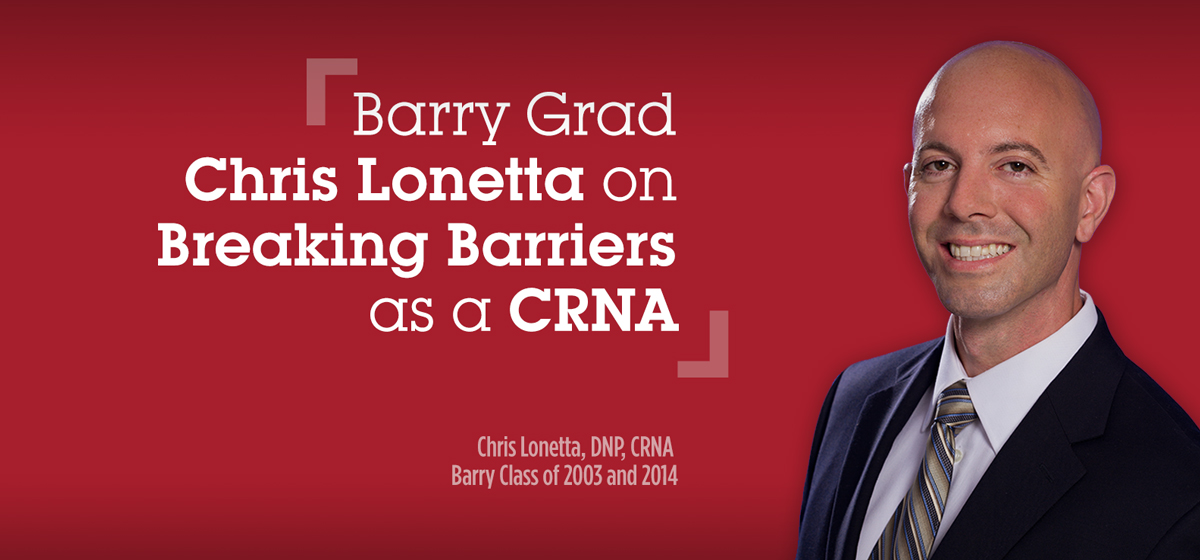Chris Lonetta, DNP, CRNA
Barry Class of 2003 and 2014
Nurse anesthesiology runs in Chris Lonetta’s family. His aunt is a CRNA and, while he was still in high school, he shadowed her in the operating room. After earning his BSN from Kent State University, Lonetta turned again to his aunt for advice on anesthesiology schools. “She guided me towards the amazing program at Barry University,” he says.
Lonetta completed his Master of Science in Anesthesiology in 2003 and launched his career at Pittsburgh’s UPMC Shadyside Hospital. By 2005, he missed Miami’s balmy weather enough to return to Florida, where he joined the medical staff at Holy Cross Hospital in Ft. Lauderdale. “I was the fourth CRNA to ever work in the operating rooms of Holy Cross,” he says. “It took a while for the surgeons, O.R. staff, anesthesiologists, and administration to understand our training, scope of practice, and quality of care, but they began to appreciate and even prefer us.” Fifteen years later, Lonetta is now the Chief CRNA at Holy Cross, where he oversees a group of 16 nurse anesthetists. He is the first person to ever hold the position at the hospital, where he also performed the first ultrasound-guided nerve block and created the regional anesthesia program as it is today. Additionally, he works as a CRNA with North American Partners in Anesthesia and devotes his research to orthopedic procedures, which are his specialty. (Currently, he is involved in a study of lower dose subarachnoid blocks.) He also teaches, which allows him to train new generations of nurse anesthetists. “I have taught many courses on ultrasound guided regional anesthesia,” he says.
As he grew his career at Holy Cross, Lonetta knew he wanted to pursue his DNP. Though many programs were available to him, he made his choice easily. “Barry University has a great reputation in the medical community and still feels like family, so I became part of Barry’s first DNP class.” Like with his master’s education, Lonetta’s doctoral work provided him with a solid clinical foundation and the confidence to seek roles not traditionally held by CRNAs. This training provided him opportunities for advancement at the corporate level; but, when Lonetta graduated in 2014, he opted to remain in clinical practice. He credits in part his participation in Barry’s DNP program for his landmark promotion at Holy Cross. “Eventually, the combination of a DNP, many years of experience, and a change in clinical culture led to being named the first Chief CRNA ever at Holy Cross Hospital,” he says. “My Barry University DNA and mentoring from Dean McFadden and Dr. Lee, inspired my drive to achieve my goals.”
Lonetta’s long list of hard-earned accomplishments makes him an exceptional advocate for Barry CRNAs just entering the field. He advises them to “always use your legally given prefix of Doctor.” He says that pushback from physicians and queries from patients are excellent opportunities to educate others about the nurse anesthesiology field and large scope of practice. “Remember,” he says, “so many other positions are accepted as doctors but can’t save a life.

